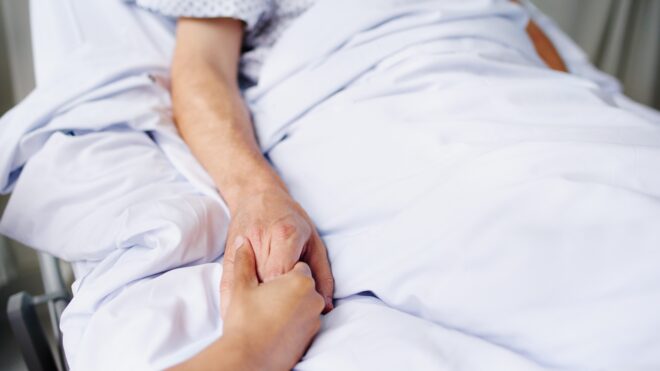Here at LittleThings, we like to encourage people to feel more comfortable with their bodies.
From explaining more about pubic hair to listing the symptoms of bladder cancer, we like to get "awkward" and "embarrassing" bodily functions out into the open.
One of the things most people feel embarrassed to talk about in public is poop.
Most adults feel very uncomfortable talking about their own bowel movements — even to people like doctors and other medical professionals.
Even if you feel OK speaking about normal bowel movements, you may feel awkward talking about constipation, diarrhea, or incontinence.
It's not the most fun to think about, but many people experience fecal incontinence — this happens when you lose control of your bowels.
You might be surprised by this, but a lot of people have to deal with fecal incontinence at some point in their lives. The best thing you can do for fecal incontinence is know more about it and speak to a doctor about it.
Thumbnail Photo: Wikimedia / Wetfinder
What Is Fecal Incontinence?

According to the U.S. National Library of Medicine, fecal incontinence — or bowel incontinence — "is the loss of bowel control, causing you to pass stool unexpectedly. This can range from sometimes leaking a small amount of stool and passing gas, to not being able to control bowel movements."
Fecal incontinence affects many adults over age 65, especially women. And it's not just older women.
According to Fox News, one Australian study indicates that as many as 1 in 5 adult women might experience fecal incontinence.
Why Do People Experience Fecal Incontinence?

People have fecal incontinence for a variety of different reasons.
According to the U.S. National Library of Medicine, incontinence is most often caused by problems in the anus, rectum, pelvic muscles, or nervous system.
Many adults experience fecal incontinence once in a while (like during a bout of diarrhea), but if it's recurring, it's known as chronic fecal incontinence.
Common Causes Of Fecal Incontinence

The Mayo Clinic explains that there are two primary types of fecal incontinence: urge incontinence and passive incontinence.
Urge incontinence occurs when a bowel movement comes on so suddenly that you cannot make it to the toilet in time, or you feel unable to resist the urge to defecate.
Passive incontinence occurs when you do not recognize the need to pass stool.
Both of these types of fecal incontinence have the same common causes, listed below.
Cause #1: Chronic Constipation

According to the National Institute of Diabetes and Digestive and Kidney Diseases, constipation can cause fecal incontinence.
One of the ways constipation can cause fecal incontinence is by causing nerve damage to the rectum and sphincter.
Another way constipation can cause incontinence is through fecal impaction.
Cause #2: Fecal Impaction

When you're constipated, you can end up with large, hard stools stuck in the rectum (which is known as fecal impaction) — these stretch the rectum and cause rectal muscles to relax.
Behind the hard poop, watery stool builds up, which can leak out around the hard stool.
Cause #3: Long-Term Laxative Use

According to the University of Virginia Health System, long-term laxative use or abuse can lead to fecal incontinence.
Certain laxatives can actually damage your bowels if you use them too often.
Cause #4: Anal Nerve Or Muscle Damage

Another common cause of fecal incontinence is muscle or nerve damage. If the injury affects either the nerves that sense when you have to poop or the nerves and muscles that control passing bowel movements, it can cause incontinence.
Often, women experience muscle and nerve damage after childbirth, but people may also have these injuries after stroke, spinal cord injuries, or constant straining while pooping.
#5: Other Causes

Some of the other causes of fecal incontinence include diarrhea, surgery, rectal prolapse, loss of rectal storage capacity, emotional distress, severe hemorrhoids, infection, and inactivity.
Irritable bowel syndrome has also been linked to incontinence, because IBS can trigger some of the symptoms listed above, like constipation.
Medical Treatment

If you're experiencing fecal incontinence, there are a variety of ways to treat it.
When it comes to medical treatment, doctors may prescribe medications like anti-diarrheal drugs, bulking laxatives, or injectable bulking agents.
If those don't work, your doctor may suggest surgery.
Home Treatment

Although there are a variety of medical treatment options, there are also a lot of lifestyle changes you can make to help minimize incontinence at home.
There are a few dietary changes you can make, such as eating more fiber-rich foods and cutting out coffee. There are also certain therapies your doctor might recommend.
If you or someone you know suffers from fecal incontinence, please SHARE this article!




